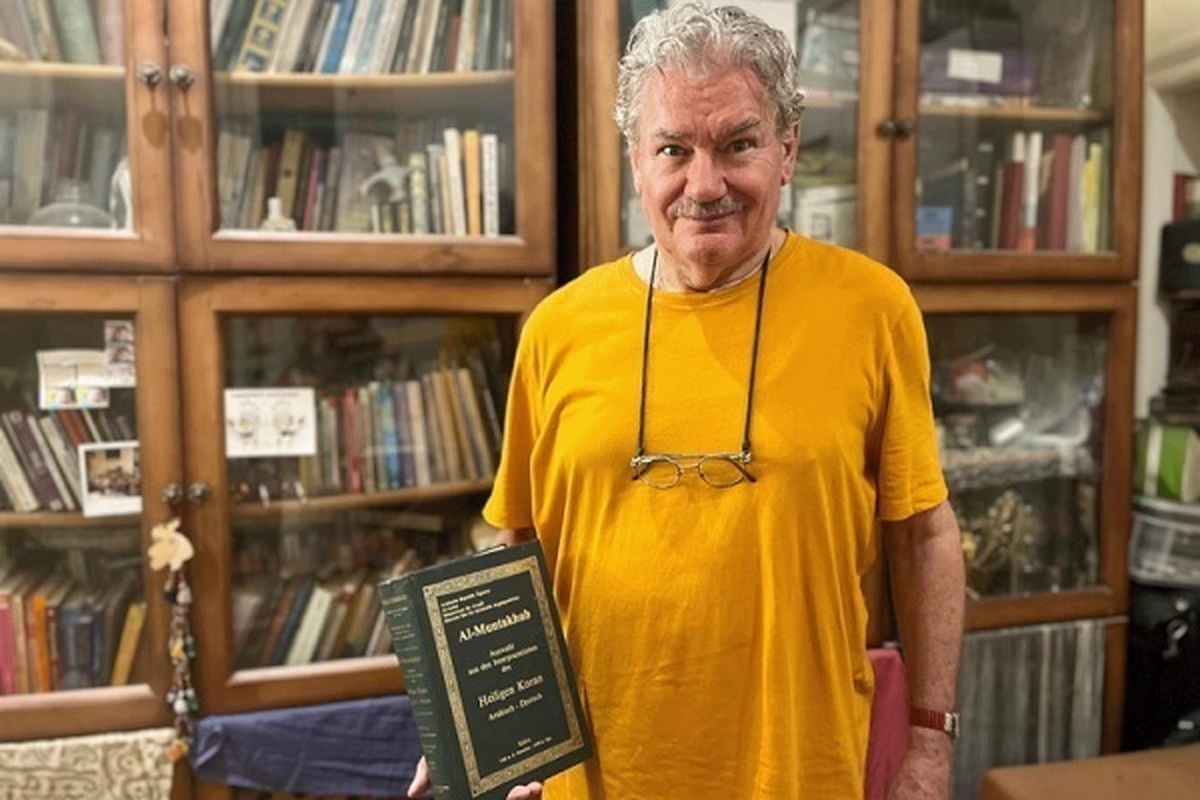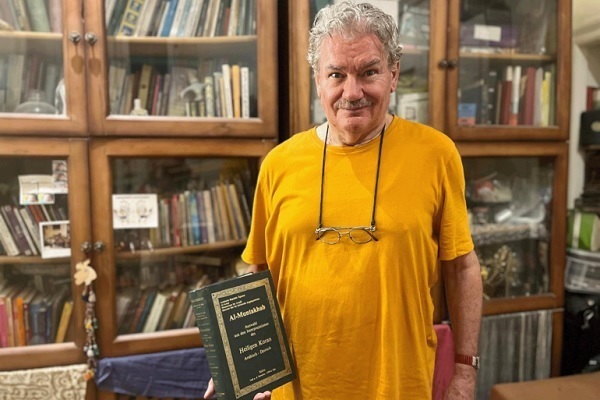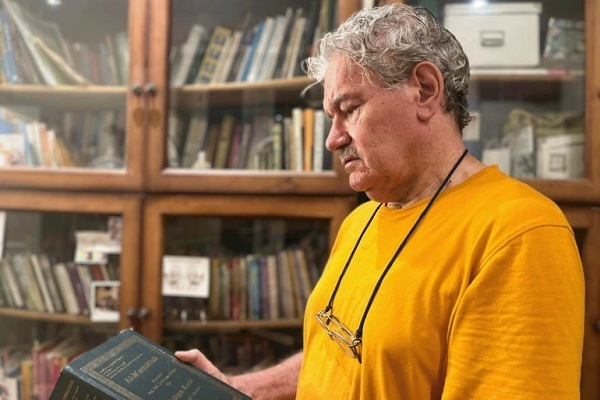Darkness to Light: Story of a German Orientalist Who Discovered Truth of Quran


In recent decades, we have seen the emergence of more thematic translations of the Quran into the German language, with some translators converting to Islam after long periods of study of the verses of the Quran, and this was reflected in their translations, which were a combination of lexical accuracy and deep inner experience. Among the most famous of these were Sigrid Hönke and Anna Marie Schimmel.
In this context, the story of Dr. Alfred Huber is interesting. He had a unique personal experience and turned from dry academic research to an atmosphere of faith and closeness to the Holy Quran. Huber's story is not only the story of a scientist, but also the journey of a man across religions and continents in search of truth, until at the end of this journey he finds a miracle in the Arabic language and the verses of the Quran.
A Young Man in Search of God
Alfred Huber was born in Vienna, the capital of Austria, and grew up in a devout Catholic Christian environment until his parents prepared him for the path of monasticism and he became a priest. But this troubled young man did not believe in the obvious and was always searching for the truth.
From an early age, he was fascinated by the issue of faith, the diversity of religions, and the stark contrasts between them. He kept asking himself, “If everyone worships God, then why are there so many differences?” This was the beginning of his long journey in search of “Allah”.
Read More:
Recalling those days, Hubert says, “I always thought about life, the hereafter, and life after death. This curiosity led me to research and travel to many countries in search of knowledge and human truth. Through my studies, I fell in love with the Middle East. The desert attracted me and I was fascinated by its beauty. I dreamed of visiting the Arab region one day and living there.”
Huber began his travels at the age of 18. After graduating from university, he traveled to Rome, the capital of Christianity in the world, on his first trip.
He says, “I went to the Vatican because I was very religious, and when I saw the large statues, I was terrified by their appearance, and the gazes of the statues and the popes terrified me. I said to myself: These are not the people who represent God on earth, nor are they the holy men that theologians imagine.”
After Italy, Huber went to Greece and then Turkey, where he experienced his first real encounter with Islam. He says, “There I experienced a human spirit, smiling faces and a very good hospitality, and I encountered the true Islam as I had read about it. Then I went to Konya and the tomb of Jalaluddin Rumi, where I experienced an indescribable spirituality and peace.
Born Again
In the early 1970s, Huber began his travels to the Orient. He traveled to Syria and Jordan, and from there to Jerusalem al-Quds. Although he was impressed by the city's holy sites, such as the Church of the Holy Sepulchre, he was not reassured by its priestly atmosphere.
His passion for reading religious texts in the original language led him to learn Hebrew, Greek, Latin, and Sanskrit. He traveled to India, where he was introduced to Buddhism. There, he had a near-death experience, but it was a rebirth.
He says, “One of their rituals is to go to the river to bathe, as the Buddha did. I went to the holy river Ganges and the strong current of the water carried me away and I almost drowned and I almost found myself in another world. A state of great peace and stillness, between life and death, came over me. When I woke up I was completely naked, because the current of the water had taken all my clothes off me. For me, it was a rebirth.”
Breaking Stereotypes
Huber’s turning point was at the Taj Mahal. “I don't know what happened to me,” he says. “"I felt peace and beauty. I felt like I was in heaven. Here I became certain that Islam was the choice of my soul, and I became certain that neither Catholicism nor Hinduism was the religion I wanted to choose for myself. I became certain that Islam was the religion my soul had chosen.”
When asked about his pre-conversion image of Islam, Huber openly admits that he did not begin his journey with a completely neutral frame of mind. “I would be lying if I said I came into this journey with a neutral frame of mind,” he says. “I come from a European Catholic background and I had stereotypical images of Islam in my mind.
Read More:
“At first, I wanted to read the Quran to prove to myself that it was a difficult and contradictory text, as the Orientalists before me had portrayed it. But to my surprise, I found in it an amazing coherence, an inner unity, and an unparalleled rhetorical power. That moment was the beginning of the breaking of the stereotypical images I had carried with me.”
Huber adds: People in the West are often born with a hatred of Islam that is reinforced by the media, which associates Islam with terrorism, and Zionist propaganda, which distorts correct concepts about the religion.
Learning Sacred Language
After learning Arabic, Huber found the text of the Quran to be radically different from the translations he had studied until then. He insists that nothing can be found that he can call a translation of the Holy Quran. Because Arabic is a sacred language and the Quran is a divine text that cannot be read except through itself.
He adds, “When I first read the Holy Quran, I fell in love with it because I loved poetry and I used to sing. I found the Holy Quran a beautiful language.”
This deep connection with the verses of the Quran eventually led him from being a lecturer at Al-Azhar University to being assigned by the Egyptian Awqaf ministry to translate the concepts of the Quran, a project that lasted 13 years.
Converting to Islam and the moment of transformation
Hubert first announced his conversion to Islam in Istanbul in 1980, in what he describes as a defining moment. He says, “I was arguing with a friend of mine, and after we finished talking, he said to me, ‘Alfred, you are a Muslim. Everything you say emphasizes that you are a Muslim.’ I was surprised by his words. Then he said to me, ‘Let’s go to the mosque.’ And at that time, I recited the Shahadah.”

He then publicly converted to Islam for the second time in 1981 at the Al-Azhar Grand Mosque, while in Egypt to teach German, to the joy of the worshippers. Reactions to his conversion to Islam varied, but the most adamant stance came from his devout Catholic mother.
“My mother got angry with me; I told her, ‘You have your religion and I have mine.’ My conversion to Islam is the result of a long search for the truth,” Huber says.
Read More:
In his assessment of Orientalism in Germany, Huber believes that any translation of the Quran that does not originate from the intellect of a devout Muslim will never be an acceptable translation, no matter how scientifically impartial. He believes that the best translator of the meanings of the Quran into German is the German poet Friedrich Ruckert, who, in his opinion, was “a true Muslim”.
Huber describes his long journey before and after converting to Islam: “I can summarize this long journey in one sentence: I moved from darkness to light.”
4305147



